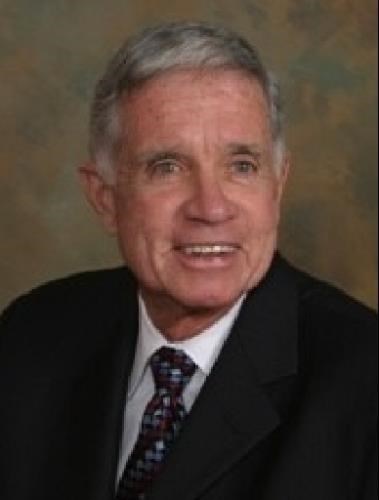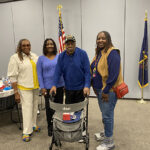One of the many wonderful things about living in Harrisburg is being a part of a diverse community.
On Saturday, Dec. 11, 2021, Harrisburg lost a local attorney, an expert in mediation and professional ethics, who worked across cultural, political, racial, religious, and geographic boundaries ensuring sound law and policy. Particularly in central Pennsylvania and all across the United States, Old Order Amish and Mennonite communities owe a debt of gratitude to Joseph Skelly for his role as a litigator in the historic landmark U.S. Supreme Court decision Wisconsin v. Yoder, 406 U.S. 205 (1972).
This U.S. Supreme Court decision exempts Old Order Amish and Mennonite children from compulsory education laws, thus preserving Amish and Mennonite culture. Joseph Skelly, a Roman Catholic, advocated for religious freedom speaking out in defense of Evangelical Christians, Orthodox Jews, Old Order Mennonites and Amish, Native Americans, and many others. He worked with diverse individuals in a very effective and practical way. Joseph Skelly’s legal career focused on the preservation of parental liberty, alternative education and free religious exercise.
Born in 1935, Joseph Gordon Skelly grew up in Oil City, Pa. His father Daniel Skelly was the district attorney for Venango County. After graduating from the University of Notre Dame, Indiana, Skelly earned his law degree at the Villanova University School of Law. Attorney William Ball was Skelly’s constitutional law professor. William Ball left Villanova Law School, moving to Harrisburg and taking the position of general counsel and executive director of the Pennsylvania Catholic Conference.
Skelly’s law partner and mentor, William Bentley Ball (1916-1999), from Rochester, N.Y., graduated from Western Reserve University in 1940. While a college student, he served in a 107th Cavalry Unit of the Ohio National Guard. Ball served in combat with the U. S. Navy during World War II and eventually retired as a lieutenant commander in the U.S. Naval Reserve. In 1948, Ball earned his law degree from Notre Dame. Ball practiced corporate law in New York first as an in-house attorney for W. R. Grace & Company and eventually for Pfizer, Inc. Beginning in 1955, Ball devoted his career to constitutional issues, particularly related to religious freedom.
After graduating from Villanova Law School, Skelly returned to Oil City, engaging in private practice as an associate in a small firm. Three years later, Ball invited Skelly to join him at the Pennsylvania Catholic Conference as assistant counsel, focusing on educational matters. In 1968, Ball and Skelly left the PCC, forming their own private practice: Ball & Skelly (later to become known as Ball, Skelly, Murren & Connell). Ball and Skelly concentrated in litigation for religious freedom. As managing partner of the firm, Skelly concentrated on general civil practice. When Ball died in 1999, Skelly undertook extensive mediation skills training and set up his own practice for alternative dispute resolution, the Skelly Dispute Resolution Center.
Skelly was interested in the ethics and professionalism of lawyers and the perception by many, both inside and outside of the legal profession, of the breakdown in civility among lawyers. Skelly lectured extensively on the subject, including presentations at continuing legal education courses. Skelly was an adjunct professor at the Harrisburg campus of Widener University School of Law, where he taught alternative dispute resolution as well as law practice management.
Skelly’s work concentrated as a mediator for special education disputes involving controversies between parents and school districts relating to special education services to children. In addition, Skelly served as a hearing officer in special education cases.
From a legal standpoint, the modern era of home education and alternative education, particularly for issues of religious freedom, began with the landmark U. S. Supreme Court decision Wisconsin v. Yoder (1972). After a string of unsuccessful battles in state courts, the 60-year struggle of the Old Order Mennonites and Amish against compulsory education culminated in Wisconsin v. Yoder (1972) argued by Ball and Skelly.
Mennonites and Amish are pacifists and, as conscientious objectors, they perform alternative service during times of military conscription. Some Americans disapproved of the Mennonites and Amish refusal to enlist or be drafted into the military during the WWI. In retaliation, in Ohio, in 1914, Mennonite and Amish fathers were fined, arrested, and convicted for refusing to send their children to Ohio public schools. Custody of Mennonite and Amish children was taken away from Mennonite and Amish parents. Farm equipment, livestock and farms were confiscated from Mennonite and Amish parents. Some Mennonite and Amish children were forced to attend state boarding schools, where Mennonite and Amish plain clothing was not permitted.
Starting in 1925, Mennonites and Amish in hostile jurisdictions began forming their own private religious schools. Some Mennonites switched from “unaccredited” home education to the use of “accredited” home-correspondence curriculum. Public educators were not placated. Public educators obtained the State v. Hoyt, 146 A. 170 (N.H. 1929), decision and implemented the precedent aggressively. Two Mennonite defeats were particularly devastating: State v. Hershberger, 144 N.E.2d 693 (Ohio App. Ct. 1955), and State v. Garber, 419 P.2d 896 (Kan. 1966), cert denied, 389 U.S. 51 (1967).
In an effort to reduce unemployment during the Great Depression, Roosevelt’s New Deal cooperated with the states in raising compulsory school attendance ages and enacting labor laws prohibiting youth apprenticeships. This became a problem for Mennonite and Amish communities where students attended schools until the eighth grade and then engaged in youth apprenticeships, learning necessary skills for operating in the local Mennonite and Amish agricultural and cottage industry economies. In 1948, in the case McCollum v. Board of Education, 333 U.S. 203, the U. S. Supreme Court eliminated public school prayer and public school Bible study. After a protracted and unsuccessful legal battle to reverse the court’s decision, many Protestants, and especially Evangelicals, turned to alternative education.
In 1965 in Olwein, Iowa, public school officials physically herded terrified Mennonite and Amish children onto school buses, forcing them into state-prescribed public education. The Rev. Dr. William C. Lindholm, a Lutheran pastor in Iowa, was horrified when he saw photographs of terrified Amish children running from truant officers in cornfields. Dr. Lindholm founded the National Committee for Amish Religious Freedom and became aware of the plight of Jonas Yoder of Wisconsin.
The Yoder family’s troubles began when the local Old Order Amish opened their own elementary school, resulting in the transfer of 37 children out of the Wisconsin government-grade schools. Kenneth J. Glewen, the local school district administrator, decided to stop his school district’s loss of $18,000 in tax revenue by filing a truancy complaint. The complaint included 15-year-old Frieda Yoder and presented the threat of criminal prosecution and other measures if her father Jonas Yoder refused to cooperate. Glewen spoke to the local newspapers about the danger of “dirty, barefoot Amish kids,” and told both the press and legal authorities how the teenagers would become “delinquent” dangers to the community unless public education intervened to prevent this growing menace to society.
On Christmas Eve 1968, Dr. Lindholm contacted Harrisburg’s law firm of Ball & Skelly, asking them to represent Jonas Yoder of Wisconsin. Ball and Skelly were contacted because they were in the forefront of the Roman Catholic Church’s efforts blocking the Kennedy and Johnson administrations from denying federal funding to parochial schools. Ball was admitted to practice before the U. S. Supreme Court in 1969 and argued nine cases relating to civil rights. He assisted in 25 other cases and practiced on the federal district and appeals levels, as well as in state courts. U. S. Supreme Court Justice Harry Blackmun told a group of law students who had just observed Ball present an oral argument at the U. S. Supreme Court how they were “privileged to see one of the finest oralists this court has ever had, Mr. Ball of Harrisburg, Pennsylvania.”
Ball & Skelly agreed to take the case, sending a formal letter dated January 20, 1969, to Dr. William C. Kahl, Wisconsin superintendent of public instruction, requesting that the threats against Jonas Yoder be discontinued on the grounds of how Yoder’s “home vocational school” qualified for the “legal excuse” exception in Wisconsin’s compulsory attendance statute. The prosecution of Jonas Yoder was handled by the Wisconsin State Deputy Attorney General Robert D. Martinson, who was assisted by local District Attorney L. A. Koenig. A bench trial was held before Judge Roger L. Elmer.
Ball & Skelly’s tactics are now a familiar part of the playbook for any knowledgeable attorney who has been involved in legally defending alternative education or parental liberty. Ball pointed out how the truancy complaint appeared to be motivated by concerns about tax revenue, not about serving the best interests of the Old Order Mennonite and Amish children. Ball and Skelly’s examination of various local government leaders proved not one Mennonite or Amish person in Green County, Wisc., was unemployed, or accepting public assistance, or involved in an illegitimate birth, or suffering from alcoholism. Thus, the evidence showed how Wisconsin’s defamations against Yoder and his community were unsubstantiated, as was the professed concern about the possible tax burdens inflicted upon Wisconsin taxpayers by the allegedly backward Mennonite and Amish communities.
Ball & Skelly also utilized a respected expert witness, Dr. John A. Hostetler, a sociologist and anthropologist professor from Temple University in Philadelphia. Hostetler ably explained why public education would destroy Amish culture. A former member of the Amish community, Hostetler was key to Ball’s strategy of placing critical facts in the record for later use on appeal. Similarly, Dr. Donald A. Erickson, associate professor of education at the University of Chicago, testified how “the current education system is detached from the real world” and Wisconsin’s government education would not help the Mennonites and Amish.
Jonas Yoder was found guilty by the trial judge and fined, but he refused to pay the fine as a matter of conscience. Ball and Skelly appealed the Yoder case, eventually all the way to the U.S. Supreme Court. An interfaith coalition, attorneys from Jewish, Seventh-Day Adventist and Church of Christ organizations rallied behind the cause, filing friend-of-the-court briefs supporting the two Catholics from Harrisburg, representing Mennonites and Amish at the request of a Lutheran pastor. But despite all of the effort and laudable ecumenical cooperation, a dejected Ball wrote Skelly a note at counsel table immediately after oral arguments had concluded: “We have LOST.”
Fortunately, Ball’s darkest fears were not realized. The U.S. Supreme Court held, 6 to 1, arguing how requiring Mennonite and Amish children to attend public school violated their constitutional right to freedom of religion. The court held that an individual’s interests in the free exercise of religion under the First Amendment outweighed the state’s interests in compelling school attendance beyond the eighth grade. In the majority opinion by Chief Justice Warren E. Burger, the court found the values and programs of secondary school were “in sharp conflict with the fundamental mode of life mandated by the Amish religion,” and argued how an additional one or two years of high school would not produce the benefits of public education cited by Wisconsin to justify the law.
Wisconsin v. Yoder (1972) proved to be one of the most important U. S. Supreme Court decisions in the history of the United States. In a decisive victory for alternative education, parental liberty, and religious freedom, the Court reaffirmed Meyer v. Nebraska (1923) and Pierce v. Society of Sisters (1925). Yoder (1972) curtailed the campaign waged against the Mennonites and Amish and other similar demographic minorities. Ball became vice chairman of the National Committee for Amish Religious Freedom.
Thanks to Ball and Skelly, Wisconsin v. Yoder (1972) also ushered in the “modern” era of alternative education and home education for non-Mennonites and Amish. But the battle was just beginning. Just as they had in the 1920s, public educators resisted implementation of the U.S. Supreme Court’s decisions. Public educators and some state courts argued how Yoder (1972) merely created a narrow “Amish exception” that did not apply to Native Americans, Mormons, African-Americans or anyone else. This legal strategy did not succeed in stopping families outside the Mennonite and Amish communities from joining the home education movement.
In 1986, U.S. Secretary of Education William Bennett suggested that private and home schools were guilty of “educational abuse” of children if compliance with government education standards did not occur (Bennett has subsequently become an advocate of home education). At the forefront of the opposition from the judicial bench were Judge Robert H. Bork, Justice John Paul Stevens, and Justice Antonin Scalia. In Troxel v. Granville, 530 U.S. 57 (2000), Justices Stevens and Scalia teamed up once again to advocate for the total elimination of constitutional protection for parental liberty, including the practical reversal of Meyers, Pierce, and Yoder. The attempt by four justices to eliminate or severely curtail parental liberty was narrowly turned back by a five-justice majority consisting of Chief Justice William Rehnquist, Justice Sandra Day O’Connor, Justice Clarence Thomas, Justice Ruth Bader Ginsberg and Justice Stephen Breyer.
At the present time, the perilous battle for the future of parental liberty and alternative education continues unabated. For over three decades, Ball and Skelly were preeminent litigators in the fight for parental liberty, alternative education and free religious exercise. Ball’s argument before the court, with Skelly’s assistance, made the case how the government must prove a compelling public need for actions affecting religious groups. Subsequent court decisions weakened this doctrine, causing Congress to pass the Religious Freedom Restoration Act of 1993 to enshrine the “compelling reason” doctrine.
Since Wisconsin v. Yoder (1972), all states must grant the Old Order Mennonites and Amish the right to establish their own schools (should they choose) or to withdraw from public institutions after completing the eighth grade. This landmark U.S. Supreme Court decision has significantly contributed to the preservation of Old Order Mennonite and Amish communities in Pennsylvania and across the nation. This was made possible because of the legal expertise of the Harrisburg law firm of Ball and Skelly. Recently, we lost Joseph Gordon Skelly, Esq., and we should pay tribute to his vocation and calling for preservation of parental liberty, alternative education, and free religious exercise. We should recognize Joe Skelly’s working across cultural, political, racial, religious, and geographic boundaries, ensuring sound law and policy. Joe Skelly represented everything that is great about our community in Harrisburg.
Jean-Paul Benowitz is the Director of Prestigious Scholarships and Fellowships at Elizabethtown College, where, for 28 years, he has been teaching courses about local Pennsylvania Dutch history and culture. He was a scholar in residence at the college’s Young Center for Anabaptist and Pietist Studies. He has lived in Harrisburg for two decades and has served with the Historic Harrisburg Association.
If you like what we do, please support our work. Become a Friend of TheBurg!






